New to project financials? Learn which processes and KPIs to master
13 min read
Time tracking
Build your perfect data foundation for spotless invoicing and deep business insights with easy time tracking.
Project management
Be a world champion project manager. Keep your projects on track - and profitable.
Resource management
Efficiently staff projects and run a predictable business with confidence.
Insights & Reporting
Get smarter - faster - to make clever decisions for long-term growth impact.
Project accounting & Invoicing
Invoice everything - fast and accurate - while staying on top of project finances.
Staff & Salary
Give accountants and HR an intelligent tool to eliminate draining administration.
Financial Systems
TimeLog offers standard integrations for all your favourite financial systems. Save time and reduce manual tasks.
Payroll Solutions
TimeLog offers standard integrations for multiple payroll solutions. Get easy salary administration and only enter payroll information once.
Add-ons
Track time automatically via Outlook, use gamification or find another add-on that can support your business.
Multiple Legal Entities
You can create synergy between your departments and across borders and offices with the Multiple Legal Entities module from TimeLog.
Business Intelligence
Utilise the insights you get from TimeLog to the fullest. Our system is ready to integrate with multiple BI solutions.
Partner Integrations
TimeLog PSA is part of a large ecosystem. Get an overview of all the partner integrations in the TimeLog family.
Economy department
Save 1-2 days a month on your invoicing process.
Project teams
From planning to execution and evaluation. Robust tools for every project manager.
Management teams
Create a performance-driven culture with solid reporting capabilities.
Large enterprises
Enhance operations and performance across entities, countries and departments.
NGOs and non-profit organisations
Simplify internal processes, spend less time on administration, and get documentation in place - at a discounted rate.
Blog
Get inspired to run an even better business with articles, guides and analyses.
Guides, podcasts and webinars
Get access to templates, guides and webinars that help and inspire you.
Help Center
Looking for help material and user guides to the TimeLog system? Look no further. Find all the help you need now.
Get a single source of truth
Discover how companies maintain a single source of truth across borders, departments, and currencies.
Get integrated
Discover the advantages customers gain from utilising our integrations and API.
Reporting in real-time
Explore how others leverage reporting to optimise their processes and make informed decisions.
Get started with resource planning
Discover how other companies thoroughly grasp their resources and enhance their ability to predict future trends.
Improved project financials
This is how the efficient financial toolbox from TimeLog helps project managers and CFOs improve their project financials.
Faster invoicing
Discover how other companies have slashed the time spent on invoicing by 75% - and uncover how you can achieve the same efficiency.
The Story of TimeLog
Get insights on TimeLog and how we can help you grow and evolve your business.
Employees
See who shows up every day to deliver the best PSA solution.
Career
What's life like at TimeLog? Are we hiring? Get the answer here.
Partner
Create even more value for your customers, as well as ours, as a TimeLog Partner.
Premium Service
Online Help Center, tailored onboarding and support from Day 1.
Corporate Social Responsibility
We work to ensure a positive impact on planet, people and businesses.
Security and GDPR
Learn more about how we work to keep your data safe and provide maximum security.
7 min read
Milestones in project management are an integral part of executing your project plan. But what is a project milestone? And how do you use them to drive successful projects?

As a project manager, you constantly need to balance stakeholders' and customers' interests while executing on time and within scope along with your team.
This balance almost always poses a real challenge.
Project milestones effectively communicate progress to all parties interested while giving you an effective tool to keep sight of important deliveries and deadlines within the project.
[Download project milestone template pack]
Just as road signs along the highway guide you towards your destination, milestones in project management serve the same purpose for project managers.
In this article, you get the A-Z on milestones: what they are, how to use them, and specific examples of project milestones.
In project management, milestones let you break down your project plan into steps or phases and identify critical handovers, key dates and major deliverables or achievements within the project.
You can think of milestones as sub-targets you set within your project timeline on your way to the overall project target.
A project can have several overall milestones. These milestones can, in turn, have their supplementing milestones in bigger projects.
The scope of the project defines the number of milestones. You should use as many as you need to maintain an overview of your project's progress.
Project milestones are primarily used in the waterfall methodology. They appear as markers in your overall project plan – usually signifying a transition from one project phase to the next.
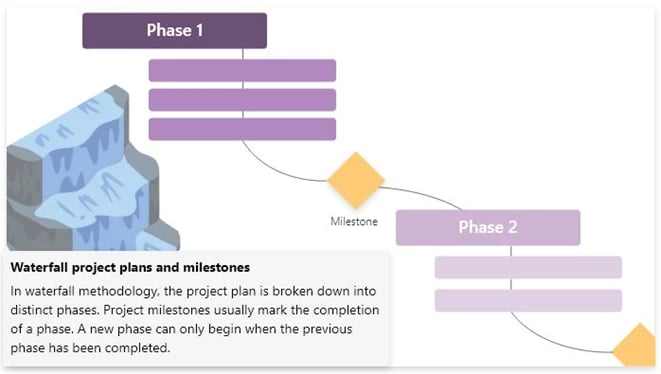
With TimeLog you get a full project management suite, including easy management of project milestones.
Try TimeLog for 30 days for free!
As every project is different, so are project milestones. However, you can consider some typical examples of project milestones for your project plan.
Below are a few examples:
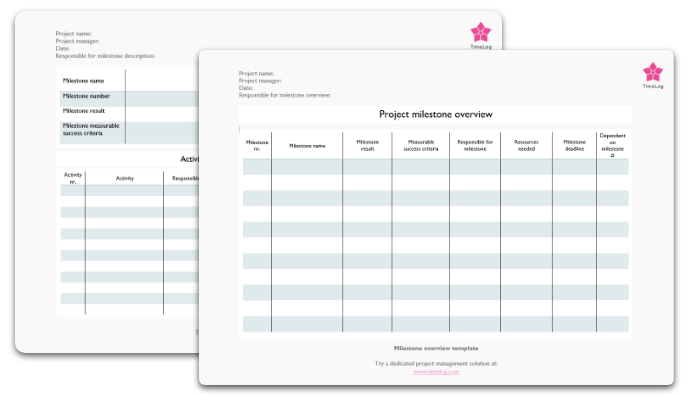
So, now you have seen the definition and a few examples. But you might wonder what exactly separates milestones from tasks and goals.
And distinguishing between milestones, tasks and goals can be tricky – especially on larger projects.
Let's break it down.
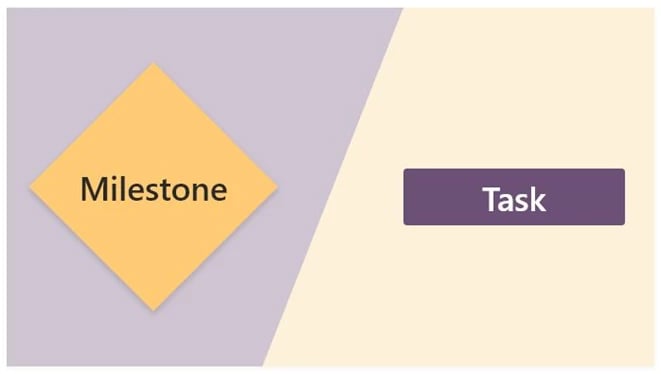
You can think of a milestone as an activity, but where the start and end time is the same. And nobody is doing any work on the activity (though you should assign a responsible for it).
For instance, a milestone like completion of phase 1 in a project plan is the "checkmark" that all the tasks in phase 1 have been completed, and we acknowledge this part of the project as being completed.
While you might not need to communicate the progress of all tasks within this phase to your stakeholders and clients, you will want to let them know you've reached a milestone you all decided should be a marker of project progress.
In that way, milestones could be described as goals – but they're not quite the same.
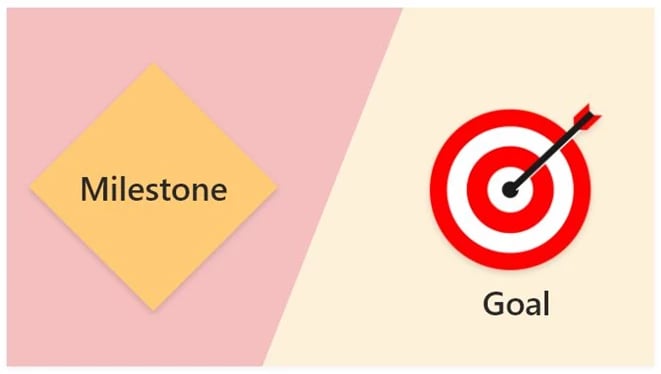
The main difference between project milestones and project goals is that milestones are something we decide should happen within the project, whereas goals are the project's desired outcome.
An example:
If you have an IT project where the goal is to reduce administration time for all employees by 20% by introducing a new solution, the milestones on the way there could be:
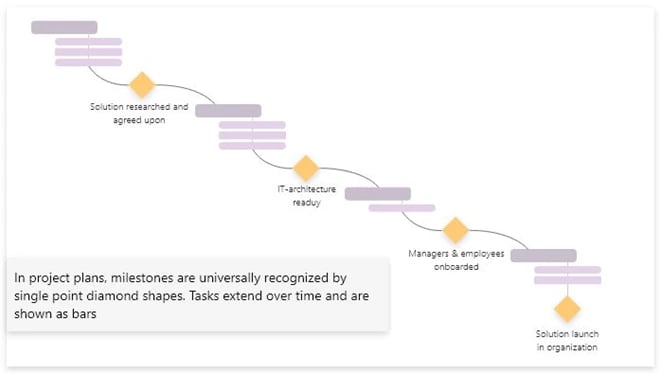
Notice that the milestones are dependent on each other and have a significant impact on the project timeline in this waterfall structure.
All these milestones have been decided on beforehand and can be checked off as completed.
Once all milestones are completed, your goal of 20% administration relief rests on the employees actually using the solution in their daily work – which is something you can't actively complete.
There are several reasons why you need milestones for managing projects.
Let's go through the four most important.
At the initial stages of planning your project, you should always be careful not to plan in more detail than what makes sense at that given point in time.
If you plan your entire project as a single string of tasks, then you'll quickly lose the overview of your plan.
Planning with milestones lets you get the full overview of essential activities and phases to complete your project within the overall deadline.
And they let you break down your project plan into manageable pieces without getting lost in detail.
In project management, your ability to communicate with all interests - your stakeholders, clients and your project team - is essential to finishing within scope, budget, and time.
Milestones act as your shared points of reference for monitoring progress within your overall project plan.
From your project's early planning phase, all interests within your project should understand what the individual milestones signify and should have agreed upon them as markers of progress.
For instance, if a project phase made up of highly specialized tasks gets delayed, your stakeholders and client can't necessarily involve themselves in the specifics of the tasks. These might only be understood by your specialist team.
Try easier milestone management with TimeLog
But they would want to be informed that your team won't reach the agreed milestone in time. Or you need additional funding for a project phase.
For a stakeholder, there's nothing worse than trying to figure out how a priority project is progressing only to be consumed by highly technical explanations on individual tasks they don't possess the specialist knowledge to truly understand.
Because milestones let you break down the plan in phases, altering the timeline when a phase is either behind or ahead of schedule becomes more manageable.
Think of phases as chunks of tasks you have estimated the time needed to complete.
When one phase is delayed or completed before schedule, you can adjust the chunks in the project plan and get a quick overview of the impact of the adjustment.
Naturally, subsequent phases must also be adjusted in detail after this first exercise.
If your project stretches for months or even years, it can be hard to keep the spirits up if you hold back the champagne until the very end of the project.
Especially if team members are only part of minor project phases and don't see the end results.
Milestones let your team strive towards reachable goals that are not far out in the future.
And they are good opportunities to celebrate smaller achievements.
So, now you've become acquainted with some of the advantages - let's talk about how to use project milestones.

Working with milestones is an integrated part of both project planning and execution. So, this work will never be a standalone process.
While creating milestones is initially a part of the planning process, they increasingly become part of the communication process as your project team progresses.
As the communication process is specific to the organization and project type, let's go through the three main steps when planning project milestones.
If milestones are like road signs leading you towards your project destination – your project goal – you need to define that goal.
Any project needs a goal – otherwise, we refer to it as operations.
The first step of project planning should be determining that goal.
After determining your goal, you and your team need to break down your project into tasks and subtasks in a work breakdown structure (WBS).
At this stage, it's a balancing act between planning to a degree of detail where you can estimate task duration, but you don't get bogged down planning every task in detail.
Remember, it never makes sense to plan in too much detail too far ahead, as circumstances such as staffing, availability, scope, etc., often change as the project progresses.
However, you need a rough estimate of the necessary phases and the duration and dependencies of activities involved.
At the end of this exercise, assign milestones to phases and critical activities from your WBS.
While a group of people can execute tasks within a phase, the responsibility of a milestone must never fall on more than one person.
This person is responsible for reaching and completing the milestone they are assigned.
On smaller projects, the project manager might be responsible for all milestones.
But on larger projects with many people and external actors involved, responsibility for any phase should be assigned to someone close to the execution of the phase to ensure they can effectively impact that execution and be held accountable.
This applies especially if working on projects stretching across locations in many countries.
Throughout the project, you need to stay in close contact with the people responsible for milestones so you can keep track of your project.
Adding milestones to your project plan in TimeLog is easy.
Before you set your milestones, you should define the main phases of the project and the larger subtasks included.
Defining the main phases and tasks gives you an overview of the project's main structure. You can break down your project plan into a five-level work breakdown structure (WBS). But for now, let's keep it simple.
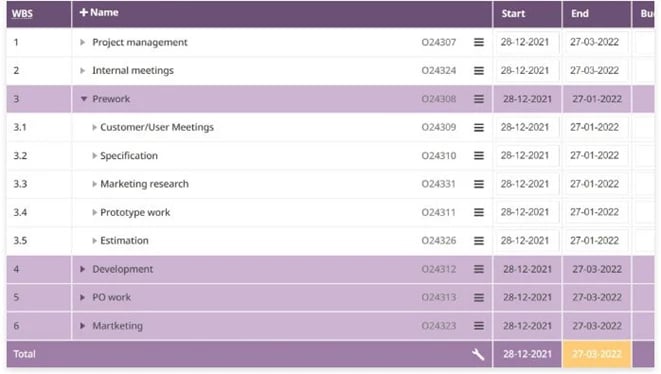
Next, add your milestones one by one.
Set milestone completion dates to get a good overview of your project's timeline. If you add a responsible team member to the milestone, they will have an accessible overview of all the milestones they're responsible for.
Drag and drop your milestones to fit into the project phases.
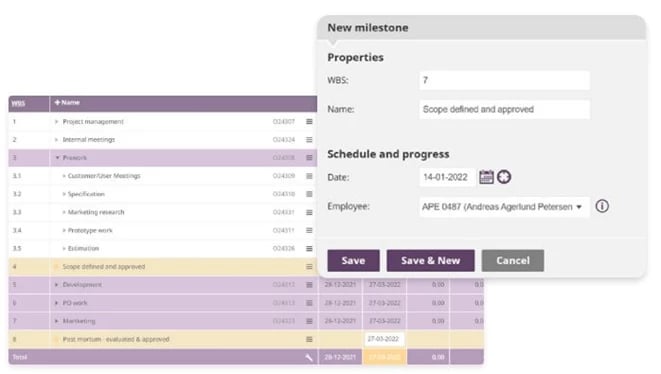
As your project progresses, get the satisfaction of ticking off completed milestones.
It always looks good on any project plan.
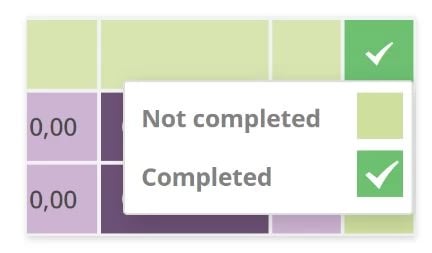
If you manage more than one project or need to stay on top of all your company's projects, then you can use the milestone overview in TimeLog for this.
See status on milestones, deadlines and who is responsible, so you can make those quick corrections as soon as something looks off.
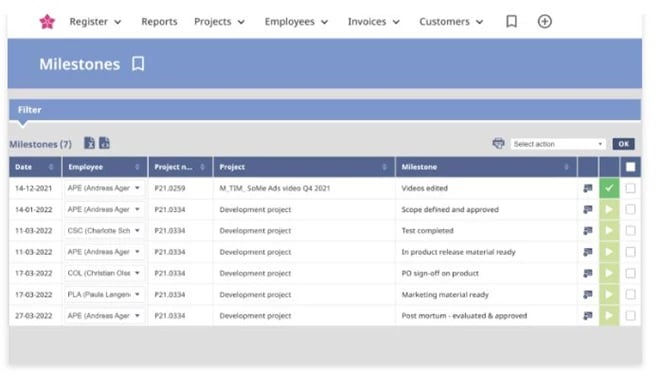
Milestones are just one tool within a whole range of project management tools included in TimeLog.
TimeLog lets you plan, execute projects, and let your whole project team track time on tasks and phases to keep you updated on progress and project financials.
You can efficiently work with budgets and contracts, so you never have to spend time in Excel to drive or invoice your projects.
You can try TimeLog for 30 days for free and see how working in a dedicated project management tool feels.
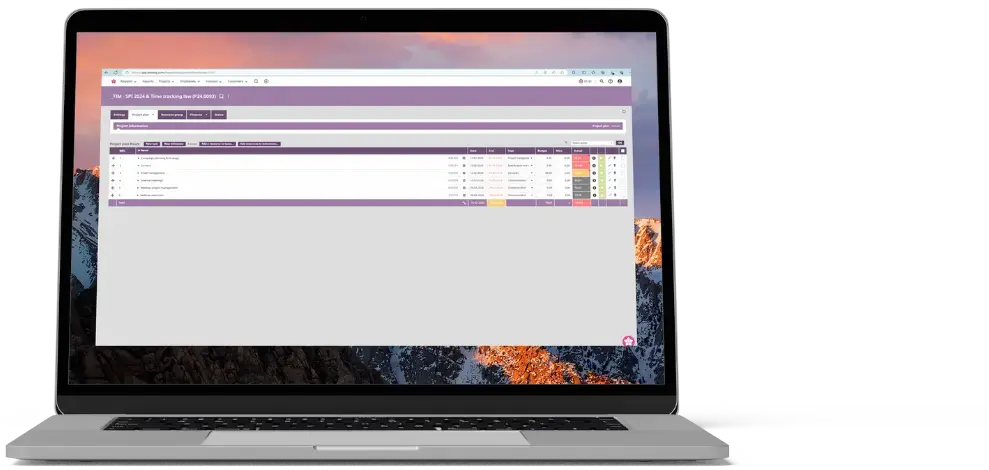
13 min read
 Read more
Read more

25 min read
 Read more
Read more
 Read more
Read more